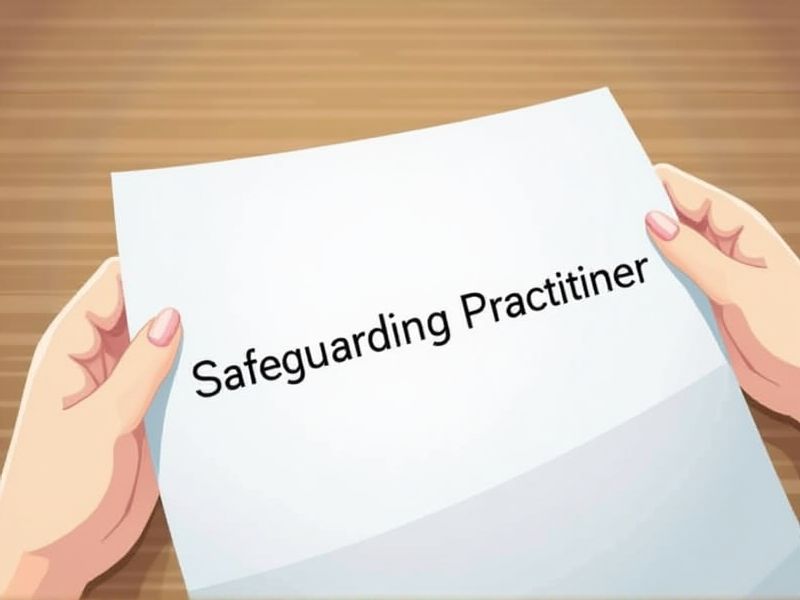
The role of a Safeguarding Practitioner requires specialized knowledge and skills to protect vulnerable individuals effectively. Certifications equip practitioners with necessary theoretical frameworks and practical tools to recognize and respond to signs of abuse or neglect. Employers often mandate certifications to ensure compliance with legal and ethical standards in safeguarding practice. Essential certifications you may need for a Safeguarding Practitioner include the following.
Level 1 Safeguarding Adults Certificate
Acquiring a Level 1 Safeguarding Adults Certificate equips the practitioner with fundamental knowledge necessary to identify potential signs of abuse or neglect. This training fosters a more secure setting for vulnerable adults by enabling practitioners to take appropriate preventive actions. The certificate ensures compliance with regulatory requirements, which mitigates legal risks for organizations. Improved understanding cultivates increased confidence among practitioners, enhancing their overall effectiveness in safeguarding roles.
Level 2 Safeguarding Adults Certificate
The Level 2 Safeguarding Adults Certificate equips safeguarding practitioners with essential knowledge to identify signs of abuse or neglect in vulnerable populations, which enhances their ability to intervene effectively. By obtaining this certification, practitioners demonstrate a recognized competency level, ensuring adherence to legal and ethical standards in safeguarding adults. The training associated with the certificate provides practitioners with up-to-date policies and procedures, fostering a safer environment for at-risk individuals. This certification acts as a benchmark for professional development, cultivating trust from those they serve and setting a foundation for further specialization.
Level 1 Safeguarding Children Certificate
Obtaining a Level 1 Safeguarding Children Certificate ensures professionals understand the basic responsibilities and signs of child abuse or neglect. This foundational knowledge aids in early identification and timely intervention, potentially stopping harm before it escalates. The certificate also ensures consistent standards across practitioners, creating a uniform approach to child protection. As legal requirements for some roles demand this certification, it guarantees compliance with statutory safeguarding duties.
Level 2 Safeguarding Children Certificate
The Level 2 Safeguarding Children Certificate provides practitioners with an in-depth understanding of signs of abuse and neglect, directly impacting their ability to identify at-risk children. Enhanced knowledge from the certification allows practitioners to respond more effectively to safeguarding concerns, thus improving child welfare outcomes. The certification aligns with government regulations and organizational policies, ensuring practitioners adhere to legal safeguarding requirements. Training from the certificate equips practitioners with essential skills to collaborate with multi-agency teams, facilitating a coordinated response to safeguarding situations.
Prevent Duty Training Certification
Prevent Duty Training Certification is necessary for safeguarding practitioners because it equips them with the skills to identify individuals at risk of radicalization. Understanding warning signs and intervention strategies is crucial to prevent extremist influences. The certification ensures compliance with legal obligations under the Prevent Duty framework. Enhancing staff awareness reduces potential threats to community safety.
Mental Health First Aid Certification
Mental Health First Aid Certification equips safeguarding practitioners with essential skills to identify early signs of mental distress, enabling timely intervention. This certification enhances their ability to provide initial support and refer individuals to appropriate professional care. Understanding mental health issues allows practitioners to create a safer and more supportive environment for vulnerable individuals. The training also fosters a culture of empathy and awareness, reducing the stigma associated with mental health challenges.
First Aid and CPR Certification
First Aid and CPR certification equips safeguarding practitioners with the essential skills to respond effectively during medical emergencies, potentially saving lives. Having these certifications enhances their ability to assess and manage health-related risks, ultimately strengthening their role in protecting vulnerable individuals. Employers and organizations often require these certifications to ensure that practitioners meet safety standards and comply with legal regulations. The knowledge gained through certification increases confidence and competence in handling a variety of emergency situations, contributing to a safer environment for all parties involved.
Equality, Diversity, and Inclusion Certification
Equality, Diversity, and Inclusion Certification equips safeguarding practitioners with the necessary skills to recognize and address the biases that can affect decision-making. Certification enhances understanding of diverse cultural contexts, ensuring that practitioners can effectively communicate and support individuals from various backgrounds. Trained safeguarding professionals are better prepared to identify and respond to the unique needs of marginalized groups, reducing the risk of harm or neglect. Organizations with certified practitioners demonstrate a commitment to social responsibility and compliance with regulatory standards, strengthening trust within communities.
Data Protection and Confidentiality Certification
Data protection and confidentiality certification equips safeguarding practitioners with the necessary skills to handle sensitive information securely, reducing the risk of data breaches. Certification ensures practitioners comply with relevant laws and regulations, such as GDPR, which impacts trust and organizational reputation. Enhanced understanding of data handling protocols minimizes unintentional disclosure, preserving individuals' privacy. Practitioners with certification are better positioned to respond to potential data-related incidents, ensuring effective risk management.
Risk Assessment and Management Certification
Risk Assessment and Management Certification equips safeguarding practitioners with a structured approach to identify and evaluate potential hazards. This knowledge minimizes the likelihood of harm to individuals under their care by implementing effective preventive measures. Certification validates the practitioner's expertise in adhering to regulatory standards and ethical guidelines. Organizations benefit from reduced liability and improved safety outcomes by employing certified professionals.
Summary
By obtaining certifications, you enhance your credibility as a Safeguarding Practitioner. This credibility often leads to increased trust from clients and stakeholders, resulting in more opportunities for career advancement. Certifications also provide you with updated knowledge and skills, thereby improving your effectiveness in safeguarding roles. Employers benefit by having certified practitioners, which strengthens the organization's reputation and compliance with regulations.
